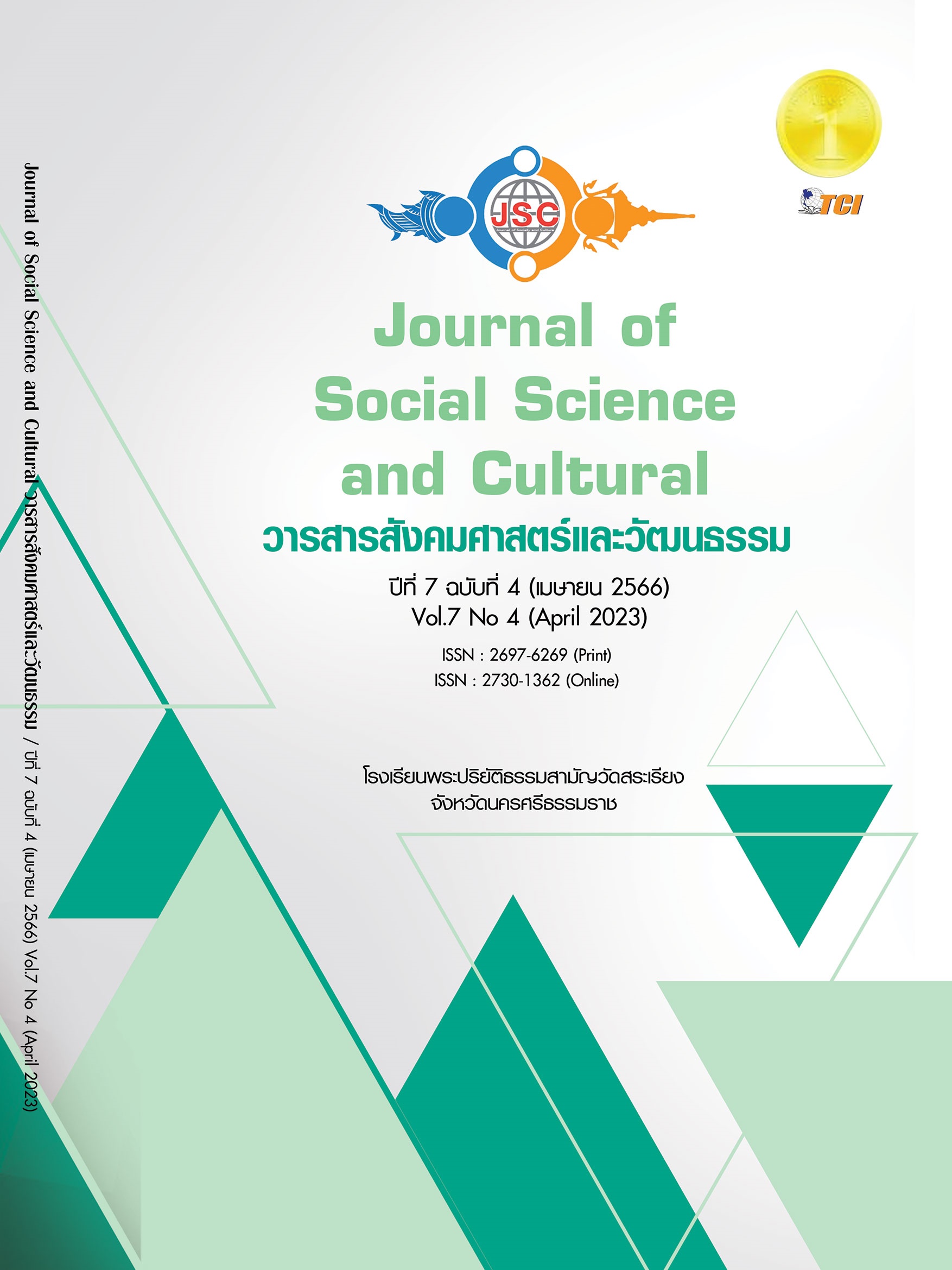THE DEVELOPMENT MODEL OF YOUNG LEADERS IN THE CONTEXT OF THEIR HOMElAND: A CASE STUDY OF THE BAN “NA GOR” YOUTH GROUP IYERWENG, BETONG DISTRICT, YALA PROVINCE
Main Article Content
Abstract
The objectives of this research paper are 1) to analyze youth leadership development patterns in their homeland context and 2) to propose ways to develop youth leaders in a participatory homeland context in a case study: "Na-go" Youth Group, Ayerweng Subdistrict, Betong District, Yala Province. It is a qualitative research. Key informants are 19 people, including head of the youth group in "Na-go" Youth Committee ,secretary of Ayerweng Subdistrict Administration Organization, officers of Ayerweng Subdistrict Administrative Organization, 2 youth groups, people and a network of youth groups. Specific selections were made based on recommendations from those involved in the youth in the area. Research tools are semi-structured interviews, and group discussions, as well as participatory observations. It is used data analysis by triangular test method for comparison findings, classified, and systematized the data into a systematic classification, then interpreted, created analytic induction, and then presented the data as narrative text. The results showed that 1) the analysis of youth leadership development patterns in their homeland consists of 5 aspects as follows: 1.The context of the "Na-go" community community, 2) the leadership and the concept of creating the "Na-go" youth group, 3) the driving factors of the "Na-go" youth group, 4) the creation of participatory action activities, 5) the coordination of groups and networks. and 2. a participatory approach to developing youth leaders in their homeland context, there are 3 factors that contribute to the movement: 1) youth dare to think, 2) youth dare to act, and 3) receive support and participation in development from the community.
Article Details
References
โกวิทย์ พวงงาม. (2553). การจัดการตนเองของชุมชนและท้องถิ่น. กรุงเทพมหานคร: บพิธการพิมพ์.
จรรยา สุวรรณทัต. (2535). พัฒนาการกับการอบรมเลี้ยงดู ประมวลบทความวิชาการฉบับพิเศษ พ.ศ. 2525-2535. กรุงเทพมหานคร: สถาบันวิจัยพฤติกรรมศาสตร์มหาวิทยาลัยศรีนครินทรวิโรฒ.
ชมพูนุช ศรีพงษ์ และคณะ. (2561). ความทุ่มเทในการปฏิบัติงานแก้ไขปัญหาและรักษาความ มั่นคงในพื้นที่จังหวัดชายแดนใต้ของกำลังพลกองทัพภาคที่ 4 กองทัพบกไทย. วารสารมหาวิทยาลัยราชภัฏยะลา, วารสารมหาวิทยาลัยราชภัฏยะลา.
ซูไฮมี มีนา. (20 กันยายน 2564). แนวทางการพัฒนาเยาวชนนักสื่อสาร. (นายคมวิทย์ สุขเสนีย์, ผู้สัมภาษณ์)
ทิศนา แขมมณี. (2549). วิธีสอนสำหรับครูมืออาชีพ. กรุงเทพมหานคร: สำนักพิมพ์แห่งจุฬาลงกรณ์.
ปริญญา สิงห์เรือง. (2561). ชุมชนเข้มแข็ง: กรณีศึกษาบ้านดอนหมู ตำบลขามเปี้ย อำเภอตระการ พืชผล จังหวัดอุบลราชธานี. ใน วิทยานิพนธ์ศิลปศาสตรมหาบัณฑิต สาขาวิชาสังคมศาสตร์และการพัฒนา. มหาวิทยาลัยอุบลราชธานี.
สถานีวิทยุเบตง จ.ยะลา. (2562). เยาวชนบ้านนากอ ตำบลอัยเยอร์เวง อำเภอเบตง จังหวัดยะลาฯ. เรียกใช้เมื่อ 10 กันยายน 2564 จาก https://thainews.prd.go.th/th/news /print_news/TCATG190321152654392
สภานโยบายวิจัยและนวัตกรรมแห่งชาติ. (2560). ร่างยุทธศาสตร์การวิจัยและนวัตกรรม 20 ปี พ.ศ. 2560 – 2579. กรุงเทพมหานคร: บริษัท โคคูน แอนด์ โค จำกัด.
อารี หนูชูสุข. (2564 กันยายน 2564). แนวทางการพัฒนาเยาวชนนักสื่อสาร. (นายคมวิทย์ สุขเสนีย์, ผู้สัมภาษณ์)
อำภา จันทรากาศ. (2543). ทุนทางชุมชนที่ส่งผลต่อความเข้มแข็งของชุมชน. ใน วิทยานิพนธ์ศึกษาศาสตรมหาบัณฑิต สาชาบริหารการศึกษา. มหาวิทยาลัยเชียงใหม่.


